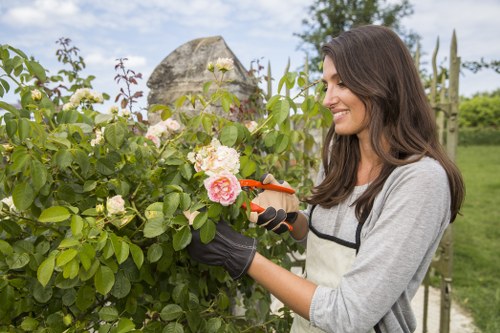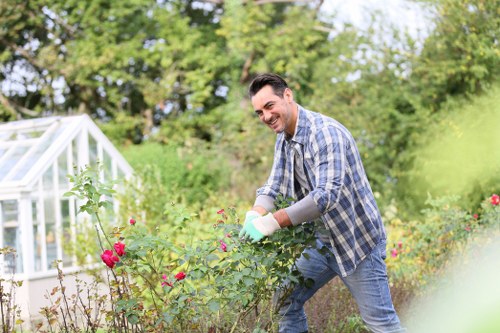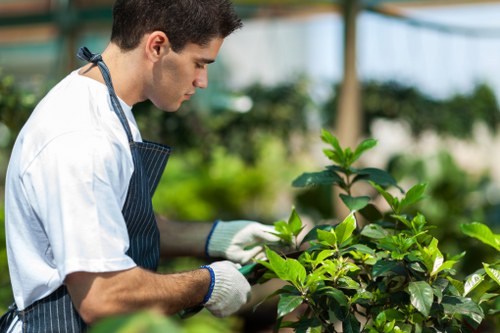Expert Garden Maintenance in Bayswater

Maintaining a beautiful garden in Bayswater requires dedication, knowledge, and the right set of skills. Whether you're a seasoned gardener or a novice looking to enhance your outdoor space, understanding the essential aspects of garden maintenance can make a significant difference. From regular upkeep to seasonal tasks, proper maintenance ensures your garden remains vibrant and healthy throughout the year.
One of the first steps in effective garden maintenance is understanding the unique climate and soil conditions of Bayswater. The region's climate can influence the types of plants that thrive, as well as the maintenance routines you'll need to follow. By selecting plants that are well-suited to the local environment, you can reduce the amount of time and effort required to keep your garden in top shape.
Proper watering is another critical component of garden maintenance. Overwatering or underwatering can lead to plant stress, diseases, and even plant death. Implementing an efficient irrigation system and understanding the specific water needs of your plants can help maintain their health and appearance.

Key Components of Garden Maintenance
Maintaining a garden involves several key components that work together to create a harmonious and thriving outdoor space. Each element plays a vital role in ensuring the overall health and beauty of your garden.
1. Pruning and Trimming
Regular pruning and trimming are essential for controlling plant growth, promoting healthy development, and preventing overgrowth. By removing dead or diseased branches, you can enhance the appearance of your plants and encourage new growth.
2. Weeding
Weeds compete with your plants for nutrients, water, and sunlight. Keeping your garden free of weeds is crucial for maintaining the health and appearance of your garden. Regular weeding helps prevent the spread of invasive species and reduces the need for chemical interventions.
3. Fertilizing
Providing your plants with the right nutrients ensures they receive the necessary elements for growth and development. Using organic or synthetic fertilizers, depending on your preference, can improve soil health and promote vibrant plant life.

Seasonal Garden Maintenance Tips
Different seasons bring unique challenges and opportunities for garden maintenance. Adapting your maintenance routines to the changing seasons can help your garden thrive year-round.
Spring
Spring is a time of renewal and growth. It's essential to prepare your garden for the upcoming growing season by clearing debris, pruning plants, and fertilizing the soil. Planting new seeds or seedlings during spring can take advantage of the favorable growing conditions.
Summer
Summer brings warmer temperatures and increased sunlight. Ensuring your garden is adequately watered and mulched can help retain moisture and prevent soil erosion. Additionally, regular pest control measures can protect your plants from common summer pests.
Autumn
As temperatures begin to drop, preparing your garden for winter is crucial. This includes clearing fallen leaves, protecting vulnerable plants, and reducing the use of water as plant growth slows down. Autumn is also an excellent time for planting certain bulbs and perennials.

Choosing the Right Plants for Bayswater Gardens
Selecting the appropriate plants for your Bayswater garden is fundamental to its success. Considerations such as climate compatibility, soil type, and maintenance requirements play a significant role in plant selection.
Native Plants
Native plants are well-adapted to the local environment, making them a low-maintenance and sustainable choice for gardens. They require less water, are more resistant to local pests, and often provide valuable habitat for native wildlife.
Ornamental Plants
Ornamental plants add aesthetic value to your garden. When choosing ornamental species, consider their color, texture, and growth habits to create visual interest and harmony within your garden design.
Edible Gardens
Incorporating edible plants such as vegetables, herbs, and fruit trees can enhance the functionality of your garden. An edible garden not only provides fresh produce but also promotes sustainable living practices.

Professional Garden Maintenance Services in Bayswater
While DIY garden maintenance can be rewarding, hiring professional garden maintenance services in Bayswater can save you time and ensure expert care for your garden. Professionals have the knowledge, experience, and tools necessary to address a wide range of garden maintenance tasks effectively.
Benefits of Hiring Professionals
- Expertise in plant care and treatment
- Time-saving services
- Access to specialized equipment
- Customized maintenance plans
Services Offered
- Regular lawn mowing and edging
- Seasonal planting and garden design
- Pest and disease management
- Soil testing and fertilization
- Tree and shrub care
Choosing the Right Service Provider
When selecting a professional garden maintenance service in Bayswater, consider factors such as reputation, range of services, pricing, and customer reviews. A reliable service provider will tailor their offerings to meet the specific needs of your garden, ensuring optimal health and beauty.
Eco-Friendly Garden Maintenance Practices
Adopting eco-friendly garden maintenance practices not only benefits the environment but also promotes a healthier garden ecosystem. Sustainable practices can reduce your garden's carbon footprint and contribute to the overall well-being of your local environment.
Composting
Composting organic waste such as leaves, grass clippings, and kitchen scraps can create nutrient-rich compost for your garden. Composting reduces landfill waste and enhances soil fertility, promoting robust plant growth.
Rainwater Harvesting
Collecting rainwater for garden use is an effective way to conserve water and reduce your reliance on municipal water sources. Rainwater harvesting systems can provide a sustainable water supply for irrigation, especially during dry periods.
Integrated Pest Management (IPM)
IPM involves using a combination of biological, cultural, and physical methods to control pests with minimal impact on the environment. By promoting natural pest predators and using non-toxic treatments, IPM maintains garden health without harmful chemicals.
Tools and Equipment for Effective Garden Maintenance
Having the right tools and equipment is essential for efficient garden maintenance. Investing in quality tools can make tasks easier and more enjoyable, ensuring you maintain your garden effectively.
Basic Tools Every Gardener Needs
- Pruning shears and loppers
- Hand trowel and spade
- Garden gloves and kneeling pads
- Lawn mower and trimmer
- Watering can or hose with adjustable nozzle
Advanced Equipment
For more extensive gardens, advanced equipment like tillers, aerators, and power sprayers can enhance your maintenance capabilities. These tools allow for more efficient soil preparation, aeration, and pest control.
Maintenance and Storage
Proper maintenance and storage of your garden tools are crucial for their longevity and performance. Regular cleaning, sharpening, and appropriate storage can prevent damage and ensure your tools are always ready for use.
Creating a Garden Maintenance Schedule
A well-planned garden maintenance schedule helps ensure that all necessary tasks are completed in a timely manner. Organizing your maintenance activities can prevent overlooked tasks and maintain garden health throughout the year.
Monthly Maintenance Tasks
- Check for signs of pests and diseases
- Prune dead or overgrown branches
- Water plants as needed, adjusting for weather changes
Seasonal Focus
Each season requires specific maintenance focuses. For example, in spring, emphasize planting and fertilizing, while in autumn, concentrate on preparing plants for winter and clearing debris.
Tracking Progress
Keeping a maintenance log can help you track tasks completed and plan for upcoming activities. This record ensures consistency and helps identify any recurring issues that may need special attention.
Common Challenges in Garden Maintenance
Maintaining a garden comes with its set of challenges. Being aware of these common issues can help you address them proactively, ensuring your garden remains healthy and beautiful.
Weather Extremes
Unpredictable weather, such as excessive heat, cold snaps, or heavy rainfall, can impact your garden's health. Implementing protective measures like mulching, shade covers, or windbreaks can mitigate weather-related damage.
Pest Infestations
Pests can quickly damage plants and disrupt your garden's ecosystem. Regular monitoring and early intervention are crucial for managing pests effectively and preventing extensive infestations.
Soil Degradation
Over time, soil can become depleted of essential nutrients, leading to poor plant growth. Regular soil testing and replenishing nutrients through composting or fertilization can maintain soil health.
Benefits of Regular Garden Maintenance
Consistent garden maintenance offers numerous benefits that enhance both the aesthetic and functional aspects of your outdoor space.
Enhanced Curb Appeal
A well-maintained garden significantly boosts your property's curb appeal. It creates a welcoming environment and can increase the overall value of your home.
Healthier Plants
Regular maintenance ensures that plants receive the necessary care, leading to healthier and more resilient growth. Healthy plants are better equipped to withstand pests, diseases, and environmental stressors.
Environmental Benefits
A thriving garden contributes to the local ecosystem by providing habitat for pollinators, birds, and beneficial insects. Additionally, healthy gardens can improve air quality and reduce urban heat islands.
DIY Garden Maintenance Tips
For those who prefer a hands-on approach, DIY garden maintenance can be both fulfilling and cost-effective. Here are some practical tips to help you maintain your Bayswater garden:
Start with a Plan
Before diving into garden tasks, create a maintenance plan that outlines your goals, tasks, and schedule. This plan will help you stay organized and ensure all aspects of garden maintenance are covered.
Use Natural Remedies
Opt for natural pest control methods, such as introducing beneficial insects or using organic sprays. These alternatives are safer for the environment and non-target organisms.
Mulch Regularly
Mulching helps retain soil moisture, suppress weeds, and regulate soil temperature. Apply a layer of organic mulch around your plants to reap these benefits.
When to Hire Professionals
While DIY maintenance is suitable for many tasks, certain situations call for professional expertise. Recognizing when to seek professional help can save your garden from potential damage and ensure it receives the care it needs.
Major Landscaping Projects
Projects such as installing new garden beds, constructing patios, or significant tree planting require specialized skills and equipment. Hiring professionals ensures these projects are executed correctly and efficiently.
Persistent Pest Problems
If pests persist despite your efforts, professional pest control services can provide targeted treatments and long-term solutions.
Soil and Drainage Issues
Problems with soil quality or drainage can significantly impact plant health. Professionals can assess and rectify these issues, ensuring optimal growing conditions for your garden.
Maintaining Garden Equipment
Proper maintenance of garden tools and equipment is essential for their longevity and efficiency. Regular upkeep can prevent unexpected breakdowns and extend the life of your tools.
Cleaning and Storage
After each use, clean your tools to remove dirt and debris. Store them in a dry, sheltered area to prevent rust and deterioration.
Sharpening and Repairs
Regularly sharpen blades and inspect tools for any signs of damage. Prompt repairs can restore functionality and ensure your tools are safe to use.
Seasonal Maintenance
Perform thorough maintenance at the end of each gardening season. This includes oiling metal parts, replacing worn-out components, and preparing tools for the next growing season.
Maximizing Garden Space in Bayswater
Optimizing your garden space ensures that every inch contributes to the overall beauty and functionality of your outdoor area. Whether you have a small patio or a large backyard, effective space management can transform your garden.
Vertical Gardening
Utilize vertical space by incorporating trellises, wall-mounted planters, and vertical gardens. This approach not only saves space but also adds a dynamic visual element to your garden.
Container Gardening
Containers offer flexibility and mobility, allowing you to grow plants in limited spaces. They are ideal for balconies, patios, and small gardens, providing opportunities for diverse plant arrangements.
Multi-Level Planting
Arrange plants at varying heights to create depth and interest. Combining ground cover, mid-level plants, and tall specimens can enhance the aesthetic appeal and maximize space usage.
Incorporating Sustainable Practices
Sustainability in garden maintenance not only benefits the environment but also creates a more resilient and self-sufficient garden. Incorporating sustainable practices can lead to long-term benefits and reduce your garden's ecological footprint.
Organic Gardening
Emphasize the use of organic fertilizers, compost, and natural pest control methods. Organic gardening promotes soil health, reduces chemical usage, and supports biodiversity.
Water Conservation
Implementing water-saving techniques such as drip irrigation, rainwater harvesting, and mulching helps conserve water and ensures efficient garden hydration.
Pollinator-Friendly Plants
Planting species that attract pollinators like bees, butterflies, and birds supports local ecosystems and enhances garden productivity through better pollination.
Enhancing Garden Aesthetics
Aesthetics play a significant role in garden maintenance, contributing to the overall ambiance and visual appeal of your outdoor space. Thoughtful design and decoration can transform your garden into a picturesque retreat.
Color Coordination
Choose plants with complementary colors to create a harmonious and visually appealing garden. Coordinating flower colors can enhance the garden's vibrancy and charm.
Garden Structures
Incorporate structures such as pergolas, arches, and gazebos to add architectural interest and provide functional spaces for relaxation and entertainment.
Lighting
Proper lighting can extend the usability of your garden into the evening hours. Use a combination of ambient, task, and accent lighting to highlight key features and create a cozy atmosphere.
Conclusion: Achieving a Thriving Garden in Bayswater
Maintaining a thriving garden in Bayswater is a rewarding endeavor that combines aesthetic beauty with environmental stewardship. By understanding the key components of garden maintenance, implementing seasonal practices, and adopting sustainable techniques, you can create a garden that flourishes year-round.
Whether you choose to manage your garden independently or enlist the help of professional services, consistent care and attention are essential for long-term success. Embrace the challenges and joys of garden maintenance, and enjoy the lush, vibrant outdoor space you've cultivated.
Contact us today to learn more about our garden maintenance services and take the first step towards a more beautiful and healthy garden in Bayswater.